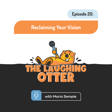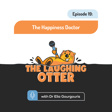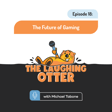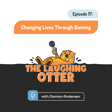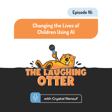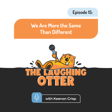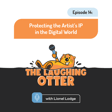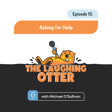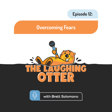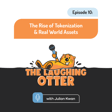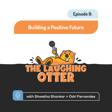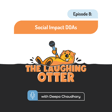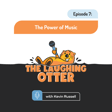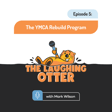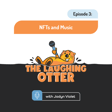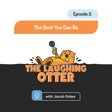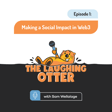Become a Creator today!Start creating today - Share your story with the world!
Start for free
00:00:00
00:00:01

Thrive as a Human Being with Mariya Radysh
Transcript
Introduction to The Laughing Otter and Guest Maria Radish
00:00:07
Speaker
Hello, everyone, and welcome to The Laughing Otter, where we are making the world a happier place, one person at a time. I'm your host, Jeff Bogginsburger. And on today's show, we are lucky to have Maria Radish, who is an expert in physical health and mental wellbeing. She's had years of experience in this area, and I'm really looking forward to talking about how we can improve our overall wellbeing and seeing where that goes.
Maria's Career and Burnout Journey
00:00:35
Speaker
Welcome to the show, Maria.
00:00:37
Speaker
Thank you for having me, such a great, it's a pleasure to be here, thank you. Fantastic. Now, maybe you can tell us a little bit about yourself and where you play in this space and where you think we, where we're headed. I'm a trade lawyer and it was a very interesting period of my life.
00:01:04
Speaker
I also had a pleasure working as an interpreter from five languages and it gave me an opportunity to meet people from all around the world. I also was a university lecturer. I did quite a few other things. But what was happening through my life is that I just kept grinding and grinding and grinding. And I thought that this is what the life was about, you know, to be constantly busy, to be constantly working.
00:01:30
Speaker
And of course it caught up with me. So I burnt out a few years ago and it was an excruciating experience. I was in, I just couldn't believe how painful it was for me physically and I could barely function mentally. And I dedicated to it my second TEDx talk.
00:01:50
Speaker
where I share more about my burnout and being at the point where, honestly, if someone offered me finasia, I would say yes right away. I would just, I would agree without thinking. I was in such a bad state. And it was me paying for not taking care of myself physically and mentally for nearly four decades.
00:02:12
Speaker
But now, great.
Family Influence on Maria's Health Research
00:02:15
Speaker
I have been doing a lot of research, I have been doing a lot of work, improving my physical health, improving my mental wellbeing. So for example, one of the things is that through practically my entire life, I was from severe anxiety. And it is one of the things that I have approved drastically.
00:02:36
Speaker
And pain is gone and I was all over my body. I was in pain all over my body for over a decade before my burnout and doctors couldn't find out what was wrong. I just kept getting the same diagnosis that I was low in vitamin D. This is what I kept hearing. But yeah, that burnout, unfortunately I had to have that major burnout to finally
00:03:03
Speaker
stop and to think what is it I was doing with my life and in my life, how come I was in that state, how to move forward, how to climb up that hole. And for more than three years, I've been doing a lot of research about how to be happy, how to be healthy, how to be fulfilled. In one word to describe it is how to thrive as a human being or how to human in the modern world.
00:03:31
Speaker
This was the umbrella. This has been the umbrella of my research. But I guess my research started a long time ago because I was born into a family of medical practitioners, in particular, my dad and my grandmother were brilliant doctors. Unfortunately, they were shoemakers without shoes. They took great care of their patients. They saved so many lives.
00:03:52
Speaker
They themselves were sleep deprived and didn't eat properly. And both of them thought, you know, they would get some rest and take care of themselves once they retire. But unfortunately, they both passed away quite young. But we had such interesting conversations. So since my childhood with both of them, we had very, very interesting conversations about health and new studies and research and
00:04:21
Speaker
a lot of things that I discussed, particularly with my dad and with his colleagues.
Thriving in Modern Life
00:04:25
Speaker
So it is something that was always of interest to me, but something that I started looking very, very closely and doing in-depth research right about time when I hit my burnout. And it's been a fascinating journey. It's very interesting because how to human is a complex puzzle.
00:04:47
Speaker
and it's becoming more and more important and more and more complex due to in particular how fast-based and how fast-changing our life has become.
00:05:01
Speaker
We've never had such a stressful life. We've never had to adapt so quickly. Life has never been this demanding. So now is the time to address those issues, to ask those questions, to gain clarity about what is it we need to do to be a thriving human being, not just to survive,
00:05:28
Speaker
you know, and barely hang on there, but to actually thrive and enjoy life, in particular in this day cave. So sorry, I went on rambling. That's okay. I think that's a great starting point for this conversation.
The Laughing Otter's Mission
00:05:48
Speaker
You raise a lot of really interesting points right off the bat. And one of the things that The Laughing Otter is all about is
00:05:58
Speaker
is, well, the biggest reason the Laughing Honor exists is to combat all of those stresses that we have and to create alternatives to the stress and anxiety and negative stimulus and actually have positive things in our lives. Now, one question that popped in my head as you were speaking, I think our listeners would be really keen to hear, what was that?
Path to Positivity and Thriving
00:06:26
Speaker
kind of, I know it wouldn't have been of, I doubt it would have been like a total switch on, switch off kind of thing, but that first kind of few weeks, months where you were making this transition into a more positive existence and thriving, what did that look like? Because I think that's where a lot of the listeners are getting bogged down as, as how do I make that change?
00:06:59
Speaker
Looking back, I remember I was crying on the phone when I called a specialist. She's a specialist in DNA performance and got microbiome, and I was very lucky to meet her through networking.
00:07:19
Speaker
Her name is Alessandra Edwards. So she was the one who helped me to start making changes. And I just remember that phone call that I was in agonizing pain. I was so exhausted. And for over a decade, every doctor was telling me that everything was fine with me, that my lab results were
The Importance of Sleep
00:07:41
Speaker
fine. And it was only, you know, vitamin D deficiency, and they couldn't find anything. Why? I was in such great pain.
00:07:50
Speaker
Um, so like I said, it was, it was very lucky for me to meet her through networking. And so we had our first conversation and of course without testing me, she couldn't, um, prescribe anything and she couldn't give, um, instructions what to do. But during that conversation, after she learned about my lifestyle, she said, look, the very first thing you need to do is learn how to sleep. And.
00:08:19
Speaker
I would say even after doing research for many years on this, on how to be happy, healthy and fulfilled, I'm more and more convinced that getting proper sleep is the very best thing that you can do for your health. So it's not only about getting the right amount of hours, the right amount of hours for you, but also making sure that you get quality restorative rest.
00:08:45
Speaker
If you learn how to sleep, and interestingly, we think that sleep is something that has to come to us just innately, you know, just naturally. And it was like that in the past, but because
00:08:57
Speaker
our world is very different and our brain has not adopted. I mean, we did evolve very significantly, but our brain has not adapted to such fast-paced, stressful lifestyle where lights on are 24-7, where food is available 24-7, when you're on your mobile device or you're watching TV till the very last minute before you go to sleep.
00:09:25
Speaker
that you go to sleep at a different time, you wake up at a different time. Our brain is just at times confused over time of the day it is.
00:09:35
Speaker
And also because like one of the reasons we do so many things in bed, not just sleeping, but also many of us work on a laptop in bed. Many of us watch TV in bed or have food in bed. So our brain gets quite confused about what is it you want me to do when you go to bed to sleep or to work in particular. So how to sleep has actually become a skill basically that you need to learn.
00:10:02
Speaker
and to make it your priority and actually to make it your main priority if you want to be happy, if you want to be healthy, if you want to be successful as well because
00:10:14
Speaker
For instance, it's already wide known that if you want to upskill yourself in something, that practicing is only part of it, but you also need to get a very, very good sleep because this is where connections between among neurons strengthen. And this is where information gets consolidated if you're getting proper sleep. And this is where actually upskilling happens.
00:10:43
Speaker
So just practicing, whether it's something physical or something mental. So whether you're learning to play a violin or whether you're
00:10:54
Speaker
you know, developing your skill of focus, or your skill of decision making, or your skill of creativity, or your skill of courage, and by the way, all of those are skills.
Self-Development Through Sleep
00:11:06
Speaker
So if you are engaged in self development, then getting proper sleep is incredibly important as well. Because this is when you actually upskill yourself when you're getting proper sleep.
00:11:20
Speaker
So sleep is, I just want to repeat myself, that sleep is probably the most, in my opinion, is the most crucial thing for happiness, health and success and fulfillment. And I'm very surprised in a particular, I've never heard of this from personal development coaches and experts and specialists.
00:11:39
Speaker
They talk about awareness, they talk about gratitude, you know, they talk about brainwashing yourself into thinking particular thoughts. But I never once heard anyone talking about how important sleep is in order to progress with self development. So yes, if you do have any health issue, whether it's mental or physical,
00:12:05
Speaker
the very first thing is to ask yourself, am I getting proper sleep? If not, then how can I improve it? How can I make it my priority? What does it need to do in order to get better rested? And interestingly, like there's so many conversations about morning routines, but I believe, I don't know, in particular for me, the most important is actually an evening routine. So an evening routine is about winding down
00:12:32
Speaker
about relaxing, about preparing your brain to go to sleep, about preparing yourself, your body to go to sleep.
Improving Sleep Quality
00:12:39
Speaker
So spending that half an hour, an hour before going to bed, just, you know, going for a walk or listening into some relaxing music and dimming all the lights, lowering all the lights because
00:12:56
Speaker
What's interesting is that our brain deducts from what type of light we get and what intensity it is and also from what direction it comes. So if you listen to many, many neuroscientists who talk about getting proper sleep, they will tell you that one of the key things to do is to lower your light. So in particular in my house, I just have those electric candles
00:13:25
Speaker
and electric branches, decorative branches that are on the floor. And at nighttime I turn them on so I don't have any overhead lights in the evenings. In order to tell my brain that yes, it's evening, it's time to relax, it's not time to be productive, but it's time to unwind and to restore yourself and to consolidate information and to do all that important work that is happening in sleep.
00:13:53
Speaker
So sleep is the most underappreciated medicine and tool. And through most of my life, it was the main reason why I burnt out because I did not understand how important it was. I was telling this stupid joke over and over that I would sleep it off once I die. So I perceived sleep as a waste of time, unfortunately.
00:14:17
Speaker
And in particular through my twenties, I slept maybe three, four hours if I'm lucky a night. And it's not what my genetic predisposition is. I could get away with it because I was still young. And when we're young, we can get away with a lot of things. But once we hit 30, let alone 40, we cannot handle as much as we could when we were younger.
00:14:40
Speaker
It becomes very, you can, you can sense it. You can, you can feel it right away if you haven't got a good night of sleep.
Debunking Sleep Myths
00:14:52
Speaker
And yeah, so through most of my life, I was just saying this stupid joke that I would slip it off once I die and I did not pay attention. And it is, it is a sad reality that it's almost a bad, sorry, it's almost a badge of honor.
00:15:11
Speaker
to not sleep. And you're applauded for, you know, especially in the business and corporate world, like, you know, oh, I get up at 4am and get to the gym by five and, you know, and then I work all day and then, you know, at 11 o'clock at night, I go to bed and I get three or four hours of sleep and then I'm back at the gym. Well, good for you, but that's not healthy. And like you said, it's such a
00:15:39
Speaker
an important part and coincidentally this morning I was on a phone call with my friends at Saving Brothers and they're releasing an app specifically around sleep because they have found that it is such a trigger for depression, anxiety, suicides,
00:16:06
Speaker
It's just people just not getting enough sleep. So yeah, I'm with you. And as a parent with a young child, the last few years, sleep is a big part of our conversation. And a lot of those tricks that you just said, well, we were applying them to our little guy, but now we do them for ourselves as well, because I know I'm so much better if I've gotten a good night's sleep.
00:16:38
Speaker
Any further tips that you think can help people in that area? There's so many tips. I'm actually writing it in my book that is coming out soon. I talk about things that don't actually work and about things that do work. For instance, I know many people think that drinking alcohol
00:17:03
Speaker
before going to sleep is helpful, but it just feels that way. It just feels like as if it's relaxing you, but it works the other way around. Actually, when you consume alcohol in the evenings, it affects your sleep very badly and you're not getting proper sleep at all.
00:17:23
Speaker
So it's one of the biggest misconceptions. Alcohol is one of the biggest misconceptions. There's also another misconception about taking melatonin. So melatonin is a hormone that was supposed to produce naturally before falling asleep.
00:17:44
Speaker
And unfortunately, many GPs, like I have, I know so many people that have trouble sleeping. And when they go to a GP, the doctor never asks them about lifestyle. They never asks them, like, is there any stress on your life? What time do you go to sleep? What time do you get up?
00:18:03
Speaker
What do you do to unwind? What are you eating patterns? They never ask those questions. So just very quickly prescribe melatonin and then send a person off. I'm against melatonin. There's been a lot of research showing that it doesn't work the way we think it should and would.
00:18:27
Speaker
Like one of the things is that those tablets, melatonin tablets, they have much greater amount of melatonin than we're supposed to produce in our body. And I think if it's something that you take continuously, then your body gets used to that input of melatonin and it stops producing melatonin naturally the way you should. It's the same as if you were to drink coffee every single morning after waking up.
00:18:57
Speaker
Your body will get used to cortisol, basically getting something from the outside in order to produce cortisol.
00:19:07
Speaker
once you, when you drink coffee in the morning and it will stop producing cortisol naturally, the cortisol that you need. So this is why if you get into this habit of having coffee first thing in the morning, you will feel worse and worse and worse and you will need coffee more and more and more because just your body will naturally not produce the appropriate amount of cortisol that you need to and it will just rely on coffee intake.
00:19:33
Speaker
So yeah, melatonin is something, I think it's okay to take it once in a while, but most definitely not. There's something ongoing in particular for younger people. So melatonin is also like one of the worst misconceptions that is out there. And with blue blockers, I think it's also quite exaggerated about how useful glasses, blue light blocking glasses are.
00:20:00
Speaker
I think that it's not as useful as advertised, it's just the product that's being widely marketed without any substantial research to back it up. And we also don't know if we put those blue blockers on, what does it exactly do to our brain? Because then there is a cutoff of that blue light and
00:20:29
Speaker
we just don't know how brain reacts to it. So there's a lot of still unknown about blue light blocking glasses and devices. And it is something that probably if you want to try, just be aware and just see how you feel whether it's working or not. Because for some people it might work just due to placebo effect because they believe that it's working.
00:20:57
Speaker
For others, maybe it actually does help. It is something that, yeah, you just need to maybe give it a try and see whether it's working for you or not. So yeah, alcohol melatonin and blue blockers, I'm on misconceptions. But what could actually help, like one of the things that helped me was to put more plants into my bedroom.
00:21:20
Speaker
And it's very easy to Google and to find out what plants produce oxygen in the nighttime. So in particular, I really love poison ivy and sorry, devil ivy. What is it called? Devil's ivy, yes, devil's ivy. And I love peace lilies. These are on really great plants that produce oxygen at night.
00:21:46
Speaker
So if you put them in your bedroom, it's one of the things that can be very helpful in order to improve your sleep. Also something that I already mentioned that you just need to use your bed for sleeping and sex and that's it. So no watching TV, sitting in bed, no working, no eating.
00:22:07
Speaker
your brain needs to understand that if you come to bed, that it's time to relax, that it's only for relaxation. It's not for digesting. It's not for thinking. It's not for writing or analyzing or nothing like that. That bed is supposed to be just for relaxing. That's it. And you will also find that you're more productive if you have a dedicated area to working. So if it's your
00:22:37
Speaker
desk or a corner in one room or a particular room where you just go in and work. Then once you get into that space, then you immediately will be more productive because the brain will understand that, okay, this is the space where we're working. Well, when you go to bed, it will understand that, okay, this is the space where we need to relax. This is where we're relaxing and recharging and restoring and regaining energy.
00:23:05
Speaker
for the next day. So very important to have this bad hygiene.
Rest and Productivity
00:23:11
Speaker
Yeah, that's what's usually called bad hygiene, to make sure that you use bad only for, as I said, sleep and sex, only for relaxation. And it highlights that, especially with things like sleep, there are so many things you can do that don't involve, like they're just lifestyle changes. They're not, you know,
00:23:33
Speaker
drug-induced or product-induced or technology-induced. They're just changing the way that you approach sleep. And even going back to where this conversation started, it's removing the negative stigma of sleeping. When you're tired, get some rest because your body's telling you, you need to take a break.
00:24:00
Speaker
I think that's, as a parent, it's one of the concerns I have with my son, with the amount of demands that are put on children these days, with the amount of homework they get and everything, and the added pressures of society saying that you gotta be this, this, this, and this. Yeah, I just want him to,
00:24:30
Speaker
to slow down and not make the same mistakes as I made of just having the throttle wide open all the time. It's okay just to do nothing. And our society has us believing that if you're not working, looking after your kids or eating or something along those lines, well, then you better be out there enjoying life.
00:24:58
Speaker
You need to be going to an event, a concert, out to dinner, a show, traveling, something. But just doing nothing is a taboo. And that's just wrong. People just need to take a step back and relax and get sleep and recharge their engines. Yeah, absolutely. When it feels like we're doing nothing,
00:25:28
Speaker
This is actually when the most important work occurs in our body and particularly in our brain. Because we cannot constantly have input. So the way a brain is designed is that there is input of information, but there also needs to be time to consolidate it and to recharge and to repair itself and to detoxify itself. So it might feel like you're doing nothing, that you're just like in particular when you meditate or when you sleep,
00:25:56
Speaker
or when you just take a walk on a beach. So it might feel like you're doing nothing, but this is when the most important work health-wise and growth-wise takes place. So it is something that I was surprised to learn as a grinder through most of my life. I was very surprised to learn that actually allowing yourself to relax, you can grow much faster.
00:26:25
Speaker
in whatever area you want to develop. And in particular, health wise, both mentally and physically, because mental and physical health are intertwined. And I'm very surprised that there's so little talked about. I'm very surprised that you are often separated. Most of the time are separated, actually intertwined. So when you let yourself relax, you achieve more both health wise and growth wise.
Balancing Fitness and Rest
00:26:51
Speaker
It's something that I
00:26:53
Speaker
wish I knew earlier because when I was mid 20s to mid 30s, I was really crazy in the gym trying to get as strong as I could get. I had a bunch of mates and we all just lifted like crazy trying to get bigger and bigger and bigger. But I plateaued and I could never figure out why I was when I would plateau and I would do what the natural
00:27:24
Speaker
what you think would help in that is I just, I worked out harder and I worked out longer and all that kind of stuff. But now I've gotten older. Um, I got out of it for a little while, but then I get back into, when I get a chance to get back into working out, I go half as hard and I noticed faster gains. And so, um, and then, but now they have found so many more studies over the last 20 sort of years.
00:27:53
Speaker
that prove exactly what you're saying, that your body needs to recuperate and you can't just keep pushing it and expect that it's going to rebuild. And like you said, the mind is the same way. And it is unfortunate that both physically and mentally, there's just this stigma and this message that
00:28:21
Speaker
If you want to be happy, you got to go harder, stronger, faster, um, and keep pushing, pushing, pushing. There's no, no, no rest for the wicked, no time to slow down. Um, but that's just not the case. And all that does is it creates a whole society of very stressed out people.
Morning Routine for Health
00:28:44
Speaker
And it's not, um,
00:28:48
Speaker
So other than kind of the sleep thing, what are little things that you do that help you thrive? What makes you happy in the day? I am working on being happy and healthy. I am putting a lot of efforts to become the best and happiest version of myself.
00:29:14
Speaker
And what's interesting is that it actually all comes down to little things. It's not something drastic that you need to do, but it's a few little things and you can feel so much better even if you just dedicate to yourself 10 minutes every morning.
00:29:31
Speaker
So in the morning, I started doing this ritual and it's just 10 minutes. Honestly, if you can't find 10 minutes for yourself, then you just don't have a life. So for 10 minutes, I go outside when the sunrise is taking place. And it is important. It's one of the most important thing to get in proper sleep is to watch sunrise that morning.
00:29:55
Speaker
It's also very good to watch sunset, but watching sunrise is the best thing you can do to improve your sleep and to improve your health, trust me. So I go out and I watch the sunrise or straight after the sunrise while the sun is still very low above the horizon. And I spent 10 minutes outside. I take my shoes off and I stand bare feet on the grass, on the grass, on earth, on sand.
00:30:25
Speaker
So I get a bit of grounding and we need at least 10 minutes of grounding every single day. We get electrons from Earth and there's been also a really great amount of research about Earthing grounding. It's called both ways, showing that even just a few minutes they
00:30:47
Speaker
have a drastic effect on our health in particular. If you have high blood pressure, it creates blood thinning effect. So it reduces your blood pressure. It reduces inflammation, whatever inflammation you have happening in your body. And it's very important because inflammation is in the root, in the center of almost every disease. It's also something that many experts already talk about
00:31:15
Speaker
widely that inflammation is the cause of the vast majority of diseases, both mental and physical, whether it's cancer or depression, the main cause is inflammation. So when we do this Earthing grounding, it reduces inflammation.
00:31:32
Speaker
And there are other, so it has a really great effect, physical and mental, if we just put our bare feet on grass, sand or earth, and particularly if it's damp. So this is why if you're on a beach, if you're walking along the shore, you know, where the sand is wet, this is where you're getting, or if you go into the ocean,
00:31:53
Speaker
I can't wait for the summer to go for a swim. If you go into the ocean, if you go into a body of water, which is like lake, not a swimming pool, but something that is naturally occurring like a lake or a river or ocean or sea, or even if you just stand or walk on wet sand, this is the best way to ground yourself to get this healing effect from the earth.
00:32:16
Speaker
So yeah, let's go back to the routine, the 10 minute routine. I go outside and I watch the sunrise for 10 minutes. So at the same time I'm standing bare feet to get my, at least some of earthy and grounding for that day. I also have with me a cup of tea, usually a herbal tea to get hydrated because when we wake up, we always dehydrate it. And you might think that you wake up hungry, but actually you wake up thirsty.
Grounding and Meditation
00:32:42
Speaker
So it's very important to hydrate yourself
00:32:45
Speaker
with a cup of water or a cup of tea in the morning. And it could be warm water with apple cider vinegar, not lemon juice, but apple cider vinegar, it's really great. Or I just personally prefer to have some herbal tea in my cup, hot herbal tea. So within the same 10 minutes, while earthing and watching the sunrise, I'm having something to drink. And at the same time, I'm doing sort of a meditation where I'm looking around and I'm just focusing on things
00:33:15
Speaker
around me. So I noticed what is it I can see in certain trees or certain birds or I don't know, something like maybe this morning I noticed that the oak by my house finally became all green. It was kind of slowly sprouting. And this morning I realized that it was covered in all the cream leaves, which was beautiful.
00:33:41
Speaker
So I look around and I'm focusing on what is it I can see, what is it I can smell, what is it I can hear. So this is like a sort of a meditation because meditation is about focusing on one thing or being present or being aware. It's not about not having thoughts in your mind, not having thoughts in your head. It's about being focused. This is what meditation are about. And there are very many different
00:34:07
Speaker
versions of meditations that you can do. But when you're standing outside, this one works really well. You know, when you're just looking around and you're focusing on what you can see, what you can hear, what you can smell on things like that, and just focusing on your environment that you're in at the moment. So just 10 minutes, 10 minutes of watching sunrise, 10 minutes of grounding, hydrating and meditating. And it has such a great effect.
00:34:35
Speaker
you would be more productive through the day and you would get such much better sleep through the night. Just do it at least for two days and you will definitely see the difference in how more creative and focused and productive you are when working and how faster you fall asleep and how better you stay asleep. So yeah, just 10 minutes. And I've started to do that as well, finding 10 minutes of
00:35:05
Speaker
of just, um, I don't want to like, uh, I, I call it meditation, but I know some people, some of the lists of meditation, uh, Hocus Pocus, but it's not, it really is just winding down, having that singular thought and, and, and just the, the staying being present, which, um, a friend of mine just taught me, uh,
00:35:31
Speaker
a little trick of just every time you're in an area where you want to be enjoying yourself like when you're out for a hike or going for a swim or at the beach or in your backyard and you find yourself thinking about work or whatever is just reel yourself in and just think about, you know, what am I hearing? What am I seeing? What am I smelling? What am I feeling? Oh, and just bring yourself back because there'll be plenty of time to think about work. So that's great.
00:36:00
Speaker
And one, one little thing that I do, um, I guess not really routine routine, but I got a little corner in my backyard where I got a fire pit and I just, I just love making a fire and just sitting there watching, watching the coals that, uh, so much so that my little guy insisted that for father's day, that, that he would buy that my wife would buy.
00:36:28
Speaker
another little fire pit because my son knows how happy I am when I'm just sitting by that fire pit. So that's what I got for Father's Day, which did, it warmed me in two ways, metaphorically and physically, because I was really happy to see that my son was so aware of what, how much I love just sitting there watching the fire.
Setting Examples for Children
00:37:02
Speaker
If I may, I really love this story and I love it in particular for two reasons. The first one, as I mentioned before,
00:37:13
Speaker
to you in our conversation, I'm writing a chapter on relationships and there is that segment about parent-child relationship. And I'm exploring and researching on what is it the best thing that a parent can do for their child. And I came to a conclusion that one of the very best things that a parent can do is to show how to be happy and healthy. So we can tell children certain things many, many, many, many times.
00:37:41
Speaker
But what they actually do, they absorb our behavior. So, you know, if you say, oh, smoking is bad, but then you're smoking, your child will pick up smoking. Or if you're saying to a child, don't get stressed, but you yourself are constantly stressed. This is what the child will pick up from you.
00:37:59
Speaker
So when you show by example how to be happy, how to be healthy, how to be fulfilled, this is the best way to help your child to be at most adaptable, to be at most resilient and to grow into a person who's happy and healthy. So it's absolutely amazing. I really love stories like that when I hear parents saying, hey, I'm doing those things and my child is doing them with me. They learn by example,
00:38:29
Speaker
So this way, not only you help yourself, but you're also raising a kid who's going to be prepared for the future because life is becoming more and more complicated and more and more stressful and requires to be a person, but most adaptable and most well-rounded and growth-oriented.
00:38:50
Speaker
And the other thing about the fireplace is that once again, it's a type of meditation. So also through most of my life, I did not take meditation seriously. And I wasn't even making fun of people who meditated. I thought that this was something that lazy people did. Like, you know, like an excuse. Yes, that was my perception. Oh my God, I can't believe it. Yeah, same way. Yeah.
00:39:17
Speaker
But now I understand how important it is because meditation is about teaching yourself to be focused on one thing at a time, which translates into every area of your life.
Focus as a Skill
00:39:31
Speaker
If you improve your focus, which is a skill, and meditation is one of the best things to improve that skill, it means that when you're with your child, you will be fully focused on your relationship with that child. When you're working, you will be fully focused on your work. When you're relaxing and resting, you will be fully focused on relaxing, resting, recharging. So it's, unfortunately, nowadays, our brain is, I don't know who this group belongs to, but I really, really love it.
00:40:01
Speaker
I do apologize, I don't know who to give credit to, but it's something that has been circulating on social media for a while. And it says that my brain is like an internet browser, there's like 30 tabs open, half of them are frozen, and I don't know where music is coming from.
00:40:20
Speaker
And this is how, I love it because this is what my brain was and sometimes still is. It's a work in progress as everyone else. But this is what kind of expected from a human being these days that you have to be
00:40:36
Speaker
constantly either busy or busy thinking and you just have to juggle so many things in your head at the same time and keep so many things which our brain is not designed to do at all and when you meditate what you do is that you close those you know tabs and you stop the music that you don't know that is coming from
00:40:56
Speaker
And you become more focused. You're not stressing out yourself with a gazillion things running through your mind, but you become focused on what is it you're doing at that time. Like you said, like if you're hiking, you're focusing on the hike, you're enjoying it, you know, you're recharging, you're admiring nature around you, you recharge from the earth, from the air, from the sun.
00:41:23
Speaker
you're focusing on that hike. You're not thinking about, oh, I need to finish that project. I need to send that email. And then I need to buy clothes for my new clothes for my son. And then, I don't know, I need to fix a fence or... It's crazy. And where I really, I noticed it about a year ago, I played drums with some mates and they were over and we're jamming away. And
00:41:51
Speaker
people and like, um, having lots of fun doing it. And, and I'm playing along and it just occurred to me that for the length, the last two minutes I had been thinking about work and while I was playing and, you know, cause I guess just, you know, muscle memory, whatever I knew, knew what I was doing. I could, I didn't have to really focus that much, but, but just the fact that I wasn't enjoying playing
00:42:21
Speaker
the music, which is something that when I do focus on it, it's a huge adrenaline rush for me. But when I'm sitting there going through the motions, thinking about work and life and this and I got to do this and the to-do list and all that, after that jam session, I was like, I got to start reevaluating what I'm doing and I got to do this different, which was a big reason
00:42:51
Speaker
It's all those little things like that that led me to starting the Laughing Otter because I knew I wasn't the only one that was out there looking for ways to just improve their lives and be happier and living more in the moment and laughing more and having more fun. So yeah, that was very real. Yeah.
00:43:14
Speaker
It's quite interesting that we think that in order to be successful professionally in particular, that it's about how many hours we work, but it's not true. It's about the quality of those hours that we spend working, how focused we are, how productive we are.
00:43:34
Speaker
You can work two, three, four hours a day and to be a huge success. And, you know, you can work 20 hours a day the way I did and get nowhere. So it's about, in particular, about how focused you are. And I would like to mention that I'm really looking forward to a book that is coming out. You may have heard of a former monk called Dandapani.
00:43:56
Speaker
So Danda Pani, I believe he gave a TEDx talk and he also has a very good program teaching meditation. And in particular, he talks a lot about focus and he proves that focus is a skill. So it is something that you can absolutely improve if you want to. And yes, his book is coming out this month, I think on the 20th or 21st.
00:44:21
Speaker
I think it's already available in US, but in Australia, I think it's gonna be available in the 20th, after the 20th of September. And I'm really looking forward to reading his book. I really look forward to learning more from him on this, because in particular, people who are prone to anxiety and prone to ADHD, the main thing to do is to improve your skill of focus. This is what it comes down to.
00:44:49
Speaker
to be focused on one thing at a time. And not only you will be more successful, but you also will enjoy your life so much more. You know, like you said, watching the fire, playing in the band, going on a hike. You know, if you're enjoying those things, then it really, it drastically will improve your quality of your life and your mental wellbeing. And if you become happier, you automatically will become more productive and successful professionally as well. And you'll stop.
Challenging Societal Norms
00:45:18
Speaker
stop listening to excuse me, you'll stop listening to all the life coaches that tell you that you need to be happier or sorry, you need to be richer, thinner, smarter, more productive, having dinner and vacations in more exotic places, sex with better looking people in order to be happier. Like it's just it's ridiculous what
00:45:47
Speaker
What people are told will make them happy is actually the antithesis of what will actually make them happy. If they just sit down, relax, and enjoy their time with their friends and family and the environment that's around them, they'll be a hundred times more happier than trying to live this dream that's always in the future. Love the person you are today. I had this discussion with someone the other day
00:46:19
Speaker
And the LinkedIn crowd, they don't get it. There's a lot of people out there that are really, really happy that have no desire to be anything more than they are today. I got a lot of friends who are exactly the same as they were in high school. And they're quite happy because they like themselves. They like the people that are around them.
00:46:43
Speaker
and they don't want more and they're content. And so, yeah, all of that. And I would bet my house they sleep a lot better than a lot of the rest of us who are constantly pushing, so. There's gotta be harmony in that because if you're staying the same 20 years after high school, that's not a very good sign that you haven't grown
00:47:13
Speaker
Well, it's like we didn't need to work. Yeah. And it's not not that they haven't grown as people, but they haven't they've grown just organically through just living. They haven't constantly been pushing themselves and and they've grown in other ways that that that are their choosing. Like, you know, like they're better fathers, better mothers, better
00:47:40
Speaker
you know, guitar players, but no desire to be world famous, but just, you know, it's because they like it. They better, they, they're better at doing woodworking in their, in their shed or whatever that are at building models. What, but it's by their choice not to be something, not, not, there's so much where I, what I don't like. And I'm afraid for my son is there's this,
00:48:10
Speaker
state this mentality now that unless you're going to write a hit song, well, what's the point of playing guitar? If you're not going to make it to NFL, what's the point of playing football? If you're if you're not going to be famous, what's the point of acting? Like, it's almost like, if you're not going to be the best, and it's going to be a YouTube sensation or something, then why do it? And
00:48:39
Speaker
I think people have lost a lot of just doing things for enjoyment rather than for anything other than just I need to be better. I need to be better. I need to be better. I recently discovered a song for myself. It originally was written by Ed Sheeran and it's called Beautiful People.
00:49:04
Speaker
And the story goes, so the plot is about a couple that love each other and they focused on each other and they look at Los Angeles crowds and they say that that environment is about, it's not about proper relationships, it's not about being a good person, but about having a Lamborghini.
00:49:31
Speaker
being able to get, to get seated in the front rows at events, like fashion shows, that it's about who you know, it's about what is it you do, it's about drugs, you know, expensive alcohol and what kind of parties you can get into. And there is a very good line that those people are surrounded but still alone. So like they go to those parties in those events and they have huge followings on Instagram.
00:50:01
Speaker
And they seem to be surrounded, but they're just so alone because they don't have any proper relationships. And the couple basically says that, hey, one of the people in the couple says that, hey, I'm afraid that we might become those so-called beautiful people.
00:50:17
Speaker
But it's very important to who we are, how we treat each other, and we're going to figure it out. So it's a really great song. It's called Beautiful People by Ed Sheeran. So I would recommend to have a listen and write a few interesting versions by other performers that you can find on YouTube. The lyrics are very, very interesting and insightful, in particular about what's actually important in life.
00:50:46
Speaker
And it is about that what's important is what kind of person you are and whether you have proper relationships in your life instead of just, you know, having thousand people that you know, whether you have proper relationships in your life.
Career Pivot and Future Tech
00:51:02
Speaker
Yeah. So I, I'm very happy that it's covered the song. I really liked it. And I would recommend to, to take a look at the lyrics. Well, that's, I think that's a beautiful way to end, uh,
00:51:14
Speaker
This conversation will not end it because I know I got lots of questions for you afterwards, but I think we'll stop that for now. Fantastic. Really enjoyed this. I share a lot of your experience and what it means to make a pivot in life. It's the reason I started laughing.
00:51:39
Speaker
because I decided the last third of my career can't be about just making money and driving myself into the ground for other people for the wrong reasons. Now I'm doing something I completely love, making people happy, giving back to the community. So I share a lot of that. Where can people find you if they want to learn more about what you're doing, find your book,
00:52:09
Speaker
All those kinds of things. Well, first of all, thank you so much for having me, Jeff. I really enjoyed chatting with you, and I look forward to continue this conversation because, yes, there's so many things to discuss. There are so many pieces to that puzzle of how to human. There's lots and lots of pieces in that puzzle.
00:52:30
Speaker
It's becoming more and more important to know those pieces and to take care of yourself and to think what kind of future is coming and how to be at most resilient, how to be at most adaptable, how to make yourself happy in particular, because this decade that we're living in is going to be very interesting.
00:52:55
Speaker
So, for instance, by the end of this decade, scientists say that they would be able to replicate any human organ that we need, which is going to be interesting. It's really going to change a relationship with our body. You know who can replace any organ that they need. It might have the fact of people not taking proper care of their health. Also, within this decade, they say that
00:53:22
Speaker
everyone on their mobile phone, everyone will have a version of Ironman's artificial intelligence unit Jarvis. So it's another thing that artificial intelligence that is self-learning and self-developing is becoming part of our life more and more. It's going to be intertwined with us very soon. Maybe even starting from next year, we're going to feel
00:53:46
Speaker
drastic changes because Elon Musk in particular said that in 2023, he's planning to release Tesla bot, Tesla artificial intelligence bot. So I think this is coming into our life much sooner than we expected. And it's going to be very important to build, to learn how to communicate with AI and how to build relationship
00:54:10
Speaker
with AI, which is also a very interesting topic to discuss. And of course, I think within this decade, space tourism would be something that's going to become common. And even something like interplanetary migration could become a reality already within this decade, which also entails very interesting conversation
00:54:36
Speaker
Because at the moment, the way it is approached, unfortunately, space tourism, exploration, migration is not human centered. So it's all about how to save on developing technology. But it's not about how to make a human being comfortable when being a space tourist or a space migrant. Also, it's a very interesting conversation as well.
00:55:01
Speaker
It's, we're living in a very interesting time. And I think this decade will bring such interesting changes. And we're just not ready for them. We really need to make ourselves aware and prepare ourselves to deal with those things and understand how certain things would affect us both physically and mentally. So yeah, there's so much to talk about. I really look forward to continue our conversation.
00:55:31
Speaker
It's the great conclusion of the show, because that's exactly where the Laughing Otter is sitting.
Web 3 and Human Well-being
00:55:40
Speaker
It's in this world of Web 3 blockchain, which some of the brightest minds in the world are working, and there's so much change from a technology side of it. But Web 3, which doesn't get the media that attention, the real power of Web 3,
00:55:59
Speaker
is the human side of it and looking at ways that we can improve people's lives. So yeah, lots to talk about.
Episode Wrap-up
00:56:09
Speaker
Thanks again for being on the show and to everybody listening, remember to visit the laughingauter.com and to find us on Twitter, Discord, Facebook, Instagram for all the latest news and cheers. And remember, we deserve to all be having a lot more fun. Thanks for listening. Thank you.
